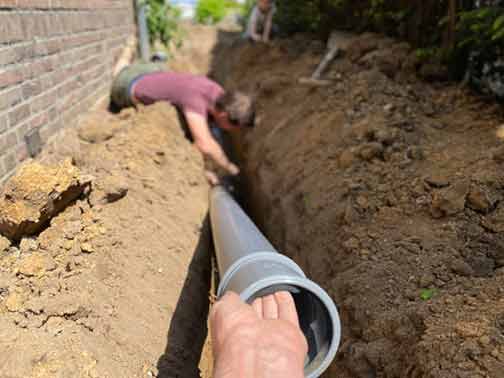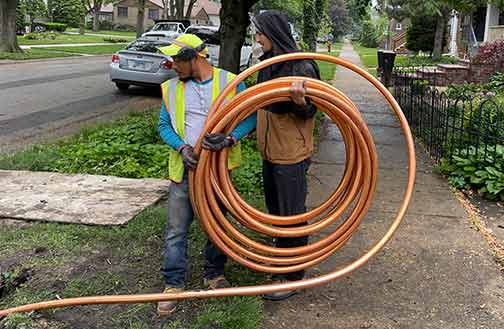
As a homeowner, it is important to understand the differences between your sewer line and water line, and how to maintain both of them properly. The sewer and water lines are two separate systems that run through the property and have different functions. This article will go over the differences between the two and provide tips on how to maintain each one to avoid costly repairs.
The Sewer Line
The sewer line is responsible for carrying the wastewater from your home to the municipal sewer system or septic tank. It connects all of the drains in your home, including the toilets, sinks, shower, and washing machine, to the main sewer line. The sewer line is typically made of cast iron, PVC or ABS plastic, or clay.
Symptoms of a Clogged Sewer Line
A clogged sewer line can cause serious problems in your home, including sewage backup, flooding, and foul odors. Detecting and cleaning out a clogged sewer line with a professional hydro jetting service early can help you avoid these problems. Look out for the following signs of a clogged sewer line:
- Slow-draining sinks, showers, or tubs
- Gurgling sounds coming from your toilet or drains
- Sewage backup in your home or yard
- Foul odors coming from your drains
Maintaining Your Sewer Line
Maintaining your sewer line is essential to keep it functioning correctly. Here are some tips to help you maintain your sewer line:
- Be careful what you flush down the toilet or pour down the drains. Avoid flushing anything besides toilet paper and human waste down the toilet. In the kitchen, avoid pouring grease or oil down the sink.
- Regularly clean your drains with hot water and a mixture of baking soda and vinegar. This will help prevent clogs from forming in the first place.
- Avoid planting trees or shrubs too close to the sewer line. The roots of trees can grow into the sewer line and cause blockages. If you discover that roots are causing problems with your sewer line, contact a professional immediately.
- Hire a professional plumber to camera inspect your sewer line regularly. An inspection can help you detect any potential problems early before they turn into expensive repairs.

The water line is responsible for carrying clean water into your home from the municipal water supply or a private well.
The Water Line
The water line is responsible for carrying clean water into your home from the municipal water supply or a private well. It connects to your water main and distributes water throughout your home to your faucets, showerhead, and appliances. The water line is typically made of copper or PVC pipe.
Symptoms of a Broken Water Line
A broken water line can cause serious damage to your property and can be expensive to repair. Here are some signs that you may have a broken water line:
- Low water pressure or no water at all
- Discolored water coming from your faucet
- Wet spots in your yard or foundation
- An unexplained increase in your water bill
Maintaining Your Water Line
Maintaining your water line is essential to ensure that you have clean, safe water flowing into your home. Here are some tips to help you maintain your water line:
Avoid putting pressure on your water line. Do not park or drive heavy vehicles over the water line, as this can cause damage.
Avoid using drain cleaners or chemicals that can corrode or damage your pipes. Instead, use hot water and baking soda or a mixture of vinegar and baking soda to clean your drains and pipes.
Winterize your pipes to avoid freezing and bursting. Disconnect hoses from outdoor faucets and wrap exposed pipes with insulation.
Regularly inspect your water line for leaks or damage. If you notice any problems, contact a plumber to repair your main water line immediately.
Conclusion
Maintaining your sewer line and water line properly is essential to avoid costly repairs and damage to your property. By following the tips outlined in this article, you can prevent clogs, blockages, and leaks in your pipes and ensure that you have clean, safe water flowing into your home. Remember, if you notice any signs of problems with your sewer line or water line, contact your local plumber to address the issue immediately.